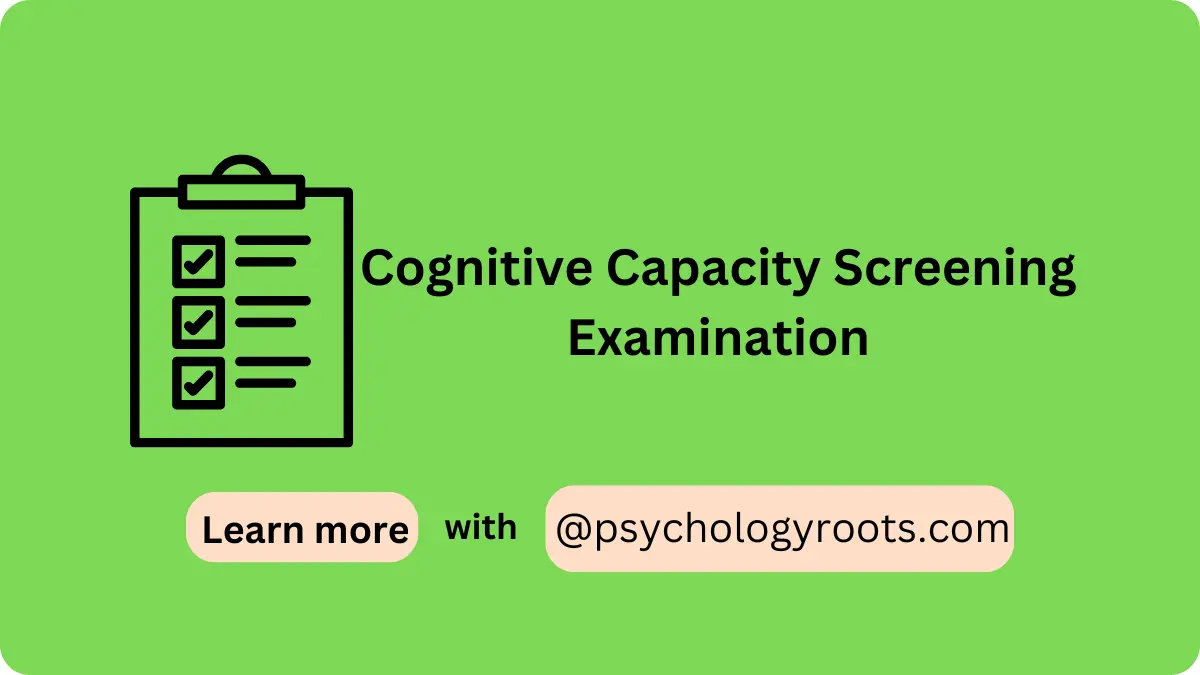Table of Contents
Cognitive Capacity Screening Examination
Here in this post, we are sharing the “Cognitive Capacity Screening Examination”. You can read psychometric and Author information. We have thousands of Scales and questionnaires in our collection (See Scales and Questionnaires). You can demand us any scale and questionnaires related to psychology through our community, and we will provide you with a short time. Keep visiting Psychology Roots.
About Cognitive Capacity Screening Examination
Scale Name
Cognitive Capacity Screening Examination
Author Details
John W. Jacobs
Translation Availability
English

Background/Description
The Cognitive Capacity Screening Examination (CCSE), developed by John W. Jacobs in 1977, is a 30-item clinician-administered screening tool designed to identify organic mental syndromes, particularly delirium and other forms of cognitive impairment, in medical patients.
Jacobs and colleagues observed that clinicians frequently relied on orientation to time, place, and person as the primary cognitive checks. However, these indicators are among the least sensitive measures of cognitive dysfunction, often failing to differentiate between organic disorders (e.g., delirium, dementia) and functional psychiatric conditions (e.g., depression, anxiety). Moreover, many earlier cognitive screening tools were criticized for educational bias and for containing questions that could make patients feel demeaned or exposed.
The CCSE was designed to overcome these limitations by evaluating judgment, mental speed, attention, and sustained effort. Its innovative format requires patients to shift rapidly between different cognitive tasks—often with interposed distractors—to better capture the fluctuating attention and disorganized thinking typical of delirium. This made the CCSE a more sensitive and clinically practical tool for use in hospital and outpatient settings.
Administration, Scoring and Interpretation
- Obtain a Copy: Access the official CCSE from clinical neuropsychology references or test repositories.
- Explain the Purpose: Inform the patient that the assessment evaluates thinking ability, attention, and memory to help identify potential cognitive concerns.
- Provide Instructions: Administer each of the 30 items verbally, guiding the patient through tasks designed to assess orientation, calculation, judgment, recall, and attention-shifting.
- Approximate Time: Completion typically requires 5–15 minutes.
- Administer the Scale: Record responses and score the test based on correct answers, with a maximum score of 30. A score of 19/20 or lower is generally used as the cut-off for possible cognitive impairment.
Reliability and Validity
- Reliability: Studies report acceptable internal consistency and test-retest reliability, indicating stable results over repeated administrations in medical populations.
- Demonstrated discriminant validity in distinguishing patients with delirium or organic brain syndromes from those with depression or anxiety.
- Correlates well with other cognitive screening measures, such as the Mini-Mental State Examination (MMSE), while offering greater sensitivity for detecting delirium.
- Clinical research has confirmed its usefulness in hospital, geriatric, and psychiatric populations, supporting both concurrent and construct validity.
Available Versions
30-Items
Reference
Jacobs, J. W., Bernhard, M. R., Delgado, A., & Strain, J. J. (1977). Screening for Organic Mental Syndromes in the Medically III. Annals of Internal Medicine, 86(1), 40-46.
Important Link
Scale File:
Frequently Asked Questions
Q1. What does the CCSE measure?
It measures cognitive functioning across multiple domains to detect delirium and organic mental syndromes.
Q2. Who can administer the CCSE?
The CCSE can be administered by physicians, psychologists, or other trained health professionals.
Q3. How is the CCSE different from the MMSE?
While both are brief cognitive screens, the CCSE places greater emphasis on attention, judgment, and mental flexibility, making it particularly sensitive to delirium.
Q4. What is the scoring cut-off for impairment?
A score of 19/20 or below indicates potential cognitive impairment and warrants further clinical evaluation.
Q5. How long does it take to complete?
It is brief, requiring only 5–15 minutes.
Disclaimer
Please note that Psychology Roots does not have the right to grant permission for the use of any psychological scales or assessments listed on its website. To use any scale or assessment, you must obtain permission directly from the author or translator of the tool. Psychology Roots provides information about various tools and their administration procedures, but it is your responsibility to obtain proper permissions before using any scale or assessment. If you need further information about an author’s contact details, please submit a query to the Psychology Roots team.
Help Us Improve This Article
Have you discovered an inaccuracy? We put out great effort to give accurate and scientifically trustworthy information to our readers. Please notify us if you discover any typographical or grammatical errors.
Make a comment. We acknowledge and appreciate your efforts.
Share With Us
If you have any scale or any material related to psychology kindly share it with us at psychologyroots@gmail.com. We help others on behalf of you.